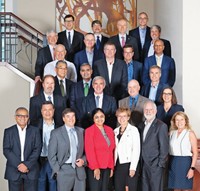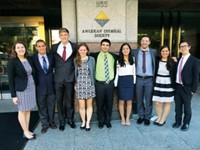Advertisement
Grab your lab coat. Let's get started
Welcome!
Welcome!
Create an account below to get 6 C&EN articles per month, receive newsletters and more - all free.
It seems this is your first time logging in online. Please enter the following information to continue.
As an ACS member you automatically get access to this site. All we need is few more details to create your reading experience.
Not you? Sign in with a different account.
Not you? Sign in with a different account.
ERROR 1
ERROR 1
ERROR 2
ERROR 2
ERROR 2
ERROR 2
ERROR 2
Password and Confirm password must match.
If you have an ACS member number, please enter it here so we can link this account to your membership. (optional)
ERROR 2
ACS values your privacy. By submitting your information, you are gaining access to C&EN and subscribing to our weekly newsletter. We use the information you provide to make your reading experience better, and we will never sell your data to third party members.
Programs
ACS offers resources on climate science
Society educates policy makers and the public through advocacy and outreach
by Linda Wang
February 8, 2020
| A version of this story appeared in
Volume 98, Issue 6

At the International Union of Pure and Applied Chemistry World Chemistry Congress and General Assembly in Paris in July 2019, the American Chemical Society signed an agreement with 14 other chemical societies to collaborate on the United Nations’ 17 sustainable development goals.
One of these goals is climate action. “The situation with global climate change has already reached catastrophic proportions and will irreversibly continue to do so unless we take drastic and immediate measures,” says ACS president Luis Echegoyen, who represented ACS during that meeting. “ACS and its members have the responsibility to inform the public as well as local, state, and national decision makers about the gravity of the situation and the need for immediate action.”
ACS’s commitment to supporting climate mitigation and adaptation activities, as well as educating the public and policy makers on the effects of climate change, goes back at least 20 years, says Anthony Pitagno, director of government affairs and alliances for ACS. “ACS was one of the first major scientific societies to go on record with stated policy positions on the issue of climate change,” he notes.
ACS’s current policy statement on global climate change states that ACS “acknowledges that climate change is real, presents serious risk for civil society and business, and that human activity is the primary cause.” The statement urges policy makers to continue supporting funding for research into the effects of climate change and recommends action on greenhouse gas reduction and climate change adaptation strategies. The statement also emphasizes the importance of educating the public on climate change.
“The policy statements both give guidance to the society on our general activities, but also our recommendations to policy makers,” says J. Carl Maxwell, manager of advocacy for ACS.
In addition, ACS is updating its Climate Science Toolkit to make the educational resources that are available on the website more accessible to the public. The resources cover topics such as atmospheric warming, greenhouse gases, and energy balance. Its climate science narratives and presentations offer responses to common climate science questions, such as “Can humans be changing the climate?” and “What is the greenhouse effect?”
Climate change is also among the topics covered in ACS’s Science and the Congress Project to educate and inform members of Congress and their staff on the importance of science and technology in addressing global issues such as climate change. “We’ve helped to lay the groundwork for the issue over the years,” says Ray Garant, assistant director of public policy at ACS. “We’re trying to help the policy makers understand what’s really going on and what their options are.”
On the global front, ACS is a nongovernmental observer for the United Nations Framework Convention on Climate Change. In addition to sending representatives to the convention’s annual meeting, ACS also sponsors 10 students to attend the meeting and blog about their observations. The students interview scientists, policy makers, and national leaders and discuss how the known science of climate change may be incorporated into international policy. This year’s meeting will be held Nov. 9–20 in Glasgow, Scotland.
ACS is forming a task force to look at climate science issues. “As the world’s largest scientific society, we wanted to create an informal advisory group of members with climate expertise to determine what else ACS can do uniquely that no other organization can do or do as well to address the climate crisis,” says Glenn Ruskin, vice president of external affairs and communications at ACS.
Pitagno encourages ACS members to join the Act4Chemistry Legislative Action Network to stay informed and weigh in on high-priority issues, such as climate change, that may affect the chemical enterprise.
Other parts of the society are also helping educate the public about climate adaptation. For example, ACS Webinars focused on climate change research in a Nov. 7, 2019, webinar titled “Combating Climate Change with New Nanobugs: Teaching Bacteria to Eat Carbon Dioxide and Light with Quantum Dots.” Prashant Nagpal of the University of Colorado Boulder and Mark Jones of Dow discussed how to convert CO2, air, water, and sunlight into a range of fuels, biodegradable plastics, and fertilizers using nanobugs.
ACS’s Reactions has produced several videos on climate change, such as “Space Mirrors and Other Weird Ways to Fight Climate Change” and “Cow Burps Are Warming the Planet.”
For those interested in a deeper dive into climate science issues, the ACS Symposium Series offers a book titled Climate Change Literacy and Education. The first volume is The Science and Perspectives from the Global Stage. The second volume is Social Justice, Energy, Economics, and the Paris Agreement.
On Feb. 25, ACS will host a Program-in-a-Box live webcast titled “The Future of Food.” Joseph Puglisi, professor of structural biology at Stanford University and head scientific adviser to Beyond Meat, will discuss the chemistry behind plant-based alternatives to animal meat and how these innovations could address global challenges such as climate change.
And on April 19–25, ACS local sections will be organizing outreach events around the US as part of Chemists Celebrate Earth Week. This year’s theme is “Protecting Our Planet through Chemistry.”




Join the conversation
Contact the reporter
Submit a Letter to the Editor for publication
Engage with us on Twitter